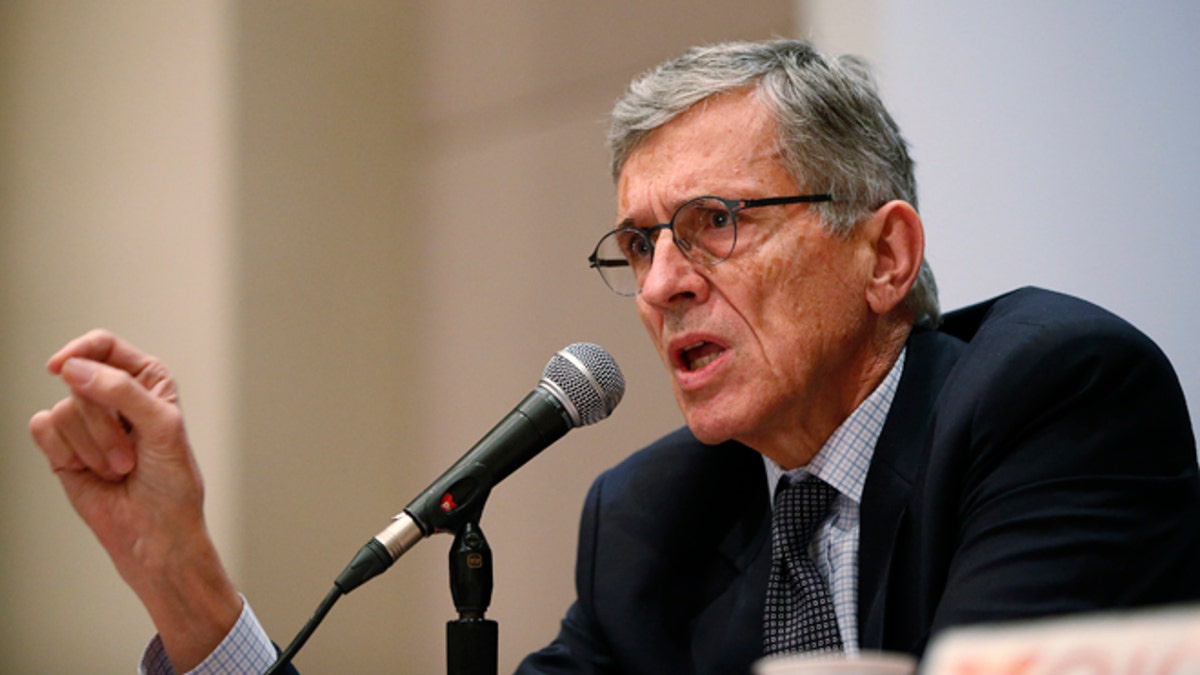
Jan. 9, 2014: Federal Communications Commission (FCC) Chairman Thomas Wheeler speaks during a Town Hall meeting in Oakland, California. (Reuters / Stephen Lam)
Tuesday’s decision by the D.C. Circuit Court to strike down most of the Obama administration’s Open Internet Order spared American innovators from the potentially devastating effects of this backdoor attempt to implement net neutrality. It also, however, left the door open for federal regulators to continue meddling with Internet freedom. Advocates for a free and open Internet must remain vigilant now more than ever, and prepare for the government’s next move in its attempt to regulate the Internet.
The Open Internet Order gave the Federal Communications Commission (FCC) jurisdiction over broadband Internet service, a desperate attempt by the Obama administration to expand the bureaucracy at a time when it was sinking into obsolescence. The rise of digital communications has rendered many of the FCC’s functions irrelevant. Like many other progressive priorities, net neutrality failed in Congress before becoming the law of the land by executive order. Under the Open Internet Order, the FCC was empowered to regulate the Internet just as various municipal agencies regulate electricity, water, and other public utilities.
Much as the Obama administration tried to package net neutrality as a victory for the “little guy,” it in effect stifled innovation in the freest and most truly democratic sector of our economy and society. The order stripped consumers of choice by preventing Internet Service Providers (ISPs) from offering different packages and levels of service tailored to the needs of individuals, families, and businesses. Had the court upheld net neutrality in its entirely, ISPs would no longer be able to offer customers options, and all consumers would be stuck with one-size-fits-all Internet service--regardless of their needs, interest, activities, or ability to pay.
Moreover, the net neutrality order was set to reduce Internet service to yet another public utility, regulated by the federal government. The Internet has been able to continually evolve, modernize, and grow to the benefit of consumers because it has remained largely free of federal regulators and open to innovators and entrepreneurs. The FCC was ready to close this window and set the Internet on the long, slow path to mediocrity trodden by municipal electric service, town sewers, and public water.
The court’s decision to strike down this particular set of regulations is a victory for Internet freedom advocates, but it also left the door wide open for future FCC intervention. Although the judges vacated this particular set of net neutrality regulations, they determined that Congress has granted the FCC the power to regulate broadband service, effectively giving the Obama administration the go-ahead to implement future restrictions on the Internet through executive order.
The Internet is already governed by antitrust and consumer protection laws, and is subject to oversight by the Federal Trade Commission and the Department of Justice. Each of these agencies has proven capable of supervising Internet service, generally without stifling innovation or harming consumers, and additional regulation by the FCC would only slow further progress.
Congress has also proven capable of responsibly managing Internet policy, and an effort to rewrite the outdated Communications Act of 1996--which was modeled on a 1934 law that regulated 19th-century technology--is underway, spearheaded by Reps. Greg Walden (R-OR) and Fred Upton (R-MI). By modifying and simplifying federal telecommunications policy for the digital age, the Walden-Upton reform package could do far more for Internet freedom and availability than net neutrality ever could.
With most of the Open Internet Order vacated, net neutrality advocates will undoubtedly attempt to reinstitute the stricken regulations through any means possible--legislatively or by executive fiat. A win for net neutrality in either arena would be a loss for all who use the Internet, and all who have benefited from innovations and improvements to Internet service over the past 20 years.
